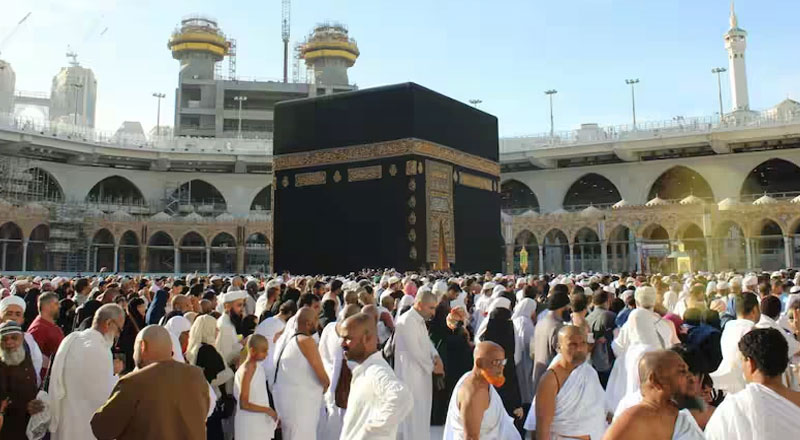A Sacred Journey with Global Dimensions
Hajj, one of the five pillars of Islam, is a sacred pilgrimage that every able-bodied Muslim with the financial means is required to undertake at least once in their lifetime. Each year, millions of Muslims from across the world converge in Mecca, Saudi Arabia, making it one of the largest annual gatherings globally.
To ensure safety and order, the Kingdom of Saudi Arabia imposes strict quotas and visa regulations, balancing religious obligations with logistical capacity. In line with this approach, Saudi Arabia has temporarily suspended visa issuance for 14 countries, including India, Pakistan, and Egypt, in the lead-up to Hajj 2025. The suspension covers Umrah, business, and family visas and is expected to last until mid-June.
This is not the first time the Kingdom has enforced temporary restrictions. Similar measures have been introduced in the past during the COVID-19 pandemic and during heightened security concerns to manage crowd control and public health. However, this year’s decision is driven by different factors.
Why the Suspension?
According to diplomatic sources quoted by media, the visa ban has been enacted primarily to address two major issues: unauthorized participation in Hajj and misuse of visa categories.
Saudi authorities have become increasingly concerned over individuals attempting to perform Hajj using non-Hajj visas such as business, family, or multiple-entry visas. This bypasses the official quota system designed to regulate and evenly distribute pilgrim numbers among nations. Unauthorized pilgrims contribute to overcrowding, strain services, and complicate logistics in an already intense period of religious activity.
Another pressing issue is the violation of labor laws. Some foreign nationals reportedly used these visas to engage in illegal employment within the Kingdom during their stay. This not only disrupts Saudi Arabia’s labor market but also poses legal and social challenges.
The Ministry of Hajj and Umrah emphasized that the suspension is purely logistical and unrelated to diplomatic tensions. It’s aimed at ensuring the pilgrimage remains safe, well-managed, and spiritually enriching for all legitimate pilgrims.
Why Was India Included in the Suspension List?
India’s inclusion in the list of 14 countries affected by the visa suspension stems from confirmed cases of visa misuse by individuals attempting to join the Hajj pilgrimage without proper authorization.
According to official reports, several travelers from India and other nations entered Saudi Arabia on Umrah or visit visas, but then overstayed their permitted duration in order to perform Hajj—bypassing the formal registration and quota system set by the Saudi government. This quota system is crucial in managing the large number of pilgrims each year by assigning each country a fixed number of slots.
Authorities have pointed to such unauthorized participation as a key factor contributing to the overcrowding and logistical strain experienced during the 2024 Hajj season, which tragically saw over 1,200 fatalities, many due to extreme heat and insufficient access to basic services.
Unofficial pilgrims often lack prearranged accommodation, transport, or access to medical support, making it significantly harder for Saudi officials to ensure their safety and coordinate emergency responses. The temporary visa suspension is part of a broader effort to curb such practices and protect the integrity and safety of the Hajj pilgrimage.
Who is Affected and What Are the Penalties?
The visa freeze impacts travelers from 14 nations: India, Pakistan, Bangladesh, Egypt, Indonesia, Iraq, Nigeria, Jordan, Algeria, Sudan, Ethiopia, Tunisia, Morocco, and Yemen. These countries account for a significant portion of global pilgrim traffic during Hajj and Umrah seasons.
Authorities have clarified that valid Umrah visa holders can still enter Saudi Arabia until April 13. However, once the deadline passes, any attempt to enter the Kingdom under unauthorized categories may result in strict penalties, including a five-year entry ban.
Travelers have been urged to comply with these new directives. The Saudi Foreign Ministry has issued a stern warning against circumventing the official Hajj registration process, highlighting its commitment to a structured and lawful pilgrimage experience.
Supportive Measures for Pilgrims
In a parallel move to enhance the pilgrim experience, the Saudi Ministry of Hajj and Umrah has launched a multilingual digital guide in 16 languages, including English, Arabic, Urdu, and Turkish. The guide is available in PDF and audio formats on the ministry’s website and aims to educate pilgrims on Hajj rituals, logistics, and safety measures—reflecting the Kingdom’s digital transformation efforts in religious services.
Strategic Restrictions for Safer Pilgrimage
While the temporary suspension may inconvenience some travelers, it ultimately serves a broader purpose: ensuring that Hajj 2025 is safe, organized, and spiritually fulfilling. The measure reinforces Saudi Arabia’s dedication to improving pilgrimage infrastructure and upholding the sanctity of Hajj.
By cracking down on unauthorized participation and visa misuse, the Kingdom is preserving the integrity of one of Islam’s holiest obligations while ensuring that every pilgrim’s journey is lawful, secure, and meaningful. With normal visa services expected to resume after mid-June, the pause is a necessary step toward a more structured and respected pilgrimage experience.
(With inputs from agencies)





